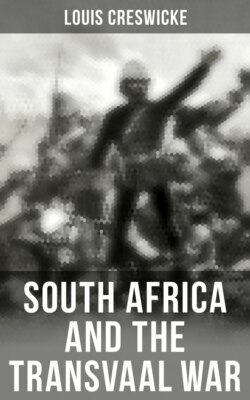Читать книгу South Africa and the Transvaal War - Louis Creswicke - Страница 14
На сайте Литреса книга снята с продажи.
THE WEB THICKENING
ОглавлениеTable of Contents
It must be remembered that between the Zulus and the Boers no boundary line had ever been fixed, and that for over a dozen years the Zulu chiefs had repeatedly implored the British Governor in Natal for advice and help in their dealings with these aggressors. It had been part of the Dutch policy—if policy it may be called—to force the Zulu gradually to edge further and further from the rich pasture lands sloping eastward of the Drakensberg Mountains, and spreading to right and left into the north and west of Zululand. Little notice had been taken of their petitions, and the Zulus had determined to take the law into their own hands. Cetchwayo, therefore, when the news of our annexation of the Transvaal reached him, was like a wild beast baulked of its prey. He was anxious for an occasion for his young warriors "to wash their spears" in the gore of his enemies, and was naturally disappointed to find them under the protection of the white man. The Natal Government attempted to soothe him—to promote peace. He remained sullen and simmered. He vented his spleen by putting several young women to death for having refused to marry his soldiers. On being remonstrated with by the Natal Government, he expressed himself with engaging candour. His own words, without comment, describe the character with which we had to deal.
"Did I ever tell Mr. Shepstone," his Majesty cried, "that I would not kill? Did Mr. Shepstone tell the white people I made such an arrangement? Because if he did he deceived them. I do kill; but I do not consider that I have done anything yet in the way of killing. Why do the white people start at nothing? I have not yet begun. I have yet to kill. It is the custom of our nation, and I will not depart from it. Why does the Governor of Natal speak to me about my laws? I shall not agree to any laws or rules from Natal, and by so doing throw the large kraal which I govern into the water. My people will not listen unless they are killed, and while wishing to be friends with the English I do not agree to give my people over to be governed by laws sent to me by them. Have I not asked the English to allow me to wash my spears since the death of my father, Upandi, and they have kept playing with me all the time, treating me as a child?" … A good deal more followed in this strain. Since his accession the gallant Cetchwayo had decided to "wash his spears" in the blood of his neighbours, and whatever the British might have to say in the matter, wash them he would. It was obvious, therefore, that a ruffian of this kind, backed by a bloodthirsty following, was a permanent danger to our Colony of Natal and to its white inhabitants. Something must be done to remove the disquiet caused by the utterances of the savage. Sir Henry Bulwer (the Governor of Natal)—to conciliate the king and to allay his fears lest his territory, like that of the Boers, should be annexed—proposed that a commission should investigate the rival claims of Boers and Zulus on border questions, and settle them by arbitration. But what Sir H. Bulwer proposed Sir Bartle Frere, High Commissioner in South Africa, disapproved. He felt that Cetchwayo and his host would be a standing menace to the borders of Natal. Nevertheless he agreed to a discussion of the vexed boundary question between Boer and Zulu, in which the commissioners declared unanimously against the claims of the former. Certain land only to west of the Blood River, held by the Boers and unchallenged by the Zulus, was confirmed to the Dutch settlers in their occupation of the same. But to this decision Sir Bartle Frere considered it expedient to add some saving clauses. These demanded, first, that Cetchwayo should adhere to the guarantees he had given and not permit indiscriminate shedding of blood; second, that he should institute from his existing military system the form of tribal quotas; third, that he should accept the presence of a British Resident; fourth, that he should protect the missionaries and their converts; and lastly, that he should surrender certain criminals and pay certain fines. His Zulu Majesty was given thirty days to consider the subject. Instead of considering he flouted it. The result was war.
